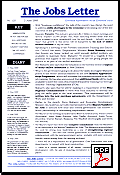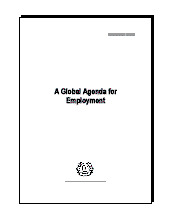



|
 |

|
| No.156 | 19 November 2001 | Essential Information on an Essential Issue |
 LAST Letter
LAST Letter
NEXT Letter   Download this issue as a PDF file
Index to Features
“ The biggest security risk, affecting the largest numbers of people worldwide, is unemployment and the resulting poverty. This is the chronic social ill of our age. It is felt more acutely since 11 September, but it was there before. Too many people feel they have lost control of their own destiny.”
" Just over a month ago, tragic events brought home to us that our complex world has
become even more uncertain, and that the need for the international community to work together
in confronting new threats is greater than ever before. The impact of 11 September is now
reverberating around the world. We know millions of people will become more vulnerable to
poverty than before. A sense of vulnerability, and a search for appropriate responses, are reshaping
international relations. Our mission to improve the lives of peoples everywhere has become
more important and urgent than ever …"
" This is a delicate moment. Inappropriate policies will test millions of families beyond
the limits of human endurance. They will deepen poverty and endanger the fundamentals of
democracy. Avoiding these dangers is as much a matter of self-interest for the North as of
solidarity with the South ..."
" We are living in a divided world where 1.5 billion people live under poverty with an income
of US$1 per day. Employment is instrumental in the fight against exclusion."
"September 11 has been the end of business-as-usual in the world, and there is a compelling
need to respond to the loss of jobs due to the attacks. I call for new initiatives in developing
and developed countries alike designed to put people back to work."
" Governments and their social partners can no longer see problems of employment in an
exclusively national context. The interdependence of our economies obligates us to work in
common and in solidarity. There is no true social development without vigorous policies leading to
full employment and without offering the possibility for all men and women to satisfy their
want through work."
"With a population of 1.26 billion and one fifth of the world labour force, my country is
confronted with the pressing task of employment promotion. It is especially difficult for the
developing countries to meet the pressing challenge brought by the new circumstances both in terms
of overall national strength and quality of the working population. We should take more
effective measures to address this issue with extraordinary courage so as to attain greater achievement."
" The fear of a lack of jobs has surfaced due to trade with countries using cheap labour.
The unequal divisions of wealth in the world are another cause for concern. In light of the
anti-globalisation protests in Seattle, Götenborg and Genoa, it is necessary to provide a response
to these challenges."
"Today, globalisation has become a scapegoat. In many societies, transparency, clear
decisions and the lack of participation of citizens do not exist. In order that a market economy
become effective, potential benefits should be maximized and risks minimized. We should be aware
of the traditional view of employment, and it should be approached from a different angle ..."
" Today's globalisation did not invent mass unemployment or inequality. However, it has
certainly failed to overcome these problems and has even added further dimensions to them —
an increase in job insecurity and in the precariousness of employment.
" Employers see decent work to be the mechanism to focus the ILO's activities on supporting
the creation of productive employment _ not make-work schemes _ but on jobs that make sense
to the employer, are affordable and contribute to that business's viability.
|
WARNING OF A JOB LOSS “TIDAL WAVE”ILO Director-General Juan Somavia says that we are "staring into the face of the first synchronized world recession of the globalization era." ILO employer vice-president, Daniel Funes de Rioja, told the Forum: "We are losing production, sales, enterprises and jobs…" ILO worker vice-president Lord Bill Brett also warns: "The loss of nearly half a million jobs in the United States in the past month shows that the tidal wave has started to move and will end up on everyone's shores…" The ILO has called for a global stimulus package to combat the crisis. It is asking the United Nations and its agencies, the Bretton Woods institutions (the World Bank and the International Monetary Fund) and the World Trade Organization, to work together and forge "a global alliance for employment".
On the final day of the Forum, delegates launched a 10-point plan aimed at reversing the trend of job losses. The plan seeks to marshal such forces as international trade, information technology, entrepreneurship, environmental sustainability, monetary and fiscal policy, education and training, health and safety, labour market policies, social protection and social dialogue to create jobs and alleviate poverty.
Global Employment Forum homepage http://www.ilo.org/public/english/employment/geforum/index.htm 
He says that the estimates of job losses and declining growth since September 11, though dire, could still be "conservative". The airline industry, in particular, will take years to recover after more 200,000 of its 4 million global employees lost their jobs after the attacks. Another 9 million jobs could be lost in the hotel and tourism industry if the economic downturn continues.
Annan, who is this year's Nobel Peace Prize laureate, says: "Nobody can forecast with precision the economic and social consequences. We may never be able to say exactly how much worse the global economic outlook has become because of the September 11 tragedy. But we can say that the consequences of these events — in terms of falling commodity prices, political tension, lower oil prices, lower investment, loss of tourism revenues, escalating trade costs and movements of refugees — will take their toll on many of those who can least afford it. We know that poor economies will pay the highest price, and that millions of people will become more vulnerable to poverty than ever before…"
— 1 billion people globally who are either unemployed, underemployed or "working poor" and living on less than one dollar a day.— the 1.7% average annual growth of the world's workforce over the past decade had outstripped the 1.4% annual rise in global employment. This means that the global economy has only created about 40 million jobs a year for the 48 million annual new entrants to the labour force.— the global economy will need to accommodate half a billion more people in the labour forces of developing countries over the coming decade.— over 97% of new job seekers in the next decade will come from these developing countries, with 65% of them in Asia.— there are an estimated 66 million unemployed young people in the world today— an increase of nearly 10 million since 1995— and these young people make up more than 40 percent of the world's total unemployed.
Daniel Funes de Rioja stresses that more countries and people need to benefit from globalisation. But he adds: "If developed countries apply protectionist measures based on their political, economic or social needs to avoid or reduce their unemployment rate or to balance their national budgets, how can developing countries believe in globalisation and free trade?"
" International organizations have a responsibility to deal creatively with this reality. It is in times of crisis that we are given the opportunity to think differently. If this means daring to step out of the cage of our orthodoxies, then let's dare. We must bring to bear the strength of our different mandates and the experience of our constituents…"
Stiglitz: "For too long, labour has acquiescent, sometimes becoming an even more effective advocate of the policies than those whose interests they serve. Let me be clear: what I am calling for is not the return to class warfare but a simple recognition of long standing principles — that there are trade-offs, that there is uncertainty, that different policies affect different groups differently, that the role of the economic adviser is to inform policymakers of the consequences of different decisions, and it is the role of the political process to make those decisions."
— first, begin with the major source of uncertainty in unemployment, and extend unemployment coverage and benefits for workers.— second, have a temporary investment tax credit ... temporary, because it would be designed to encourage people to invest now, when there is this real need.— third, introduce tax rebates directed at investment. Specifically recommended are tax changes that allow companies to do more backward averaging. Firms that have paid a lot of taxes in the past, but are willing to invest now, can use some of that backward averaging if they are going to commit to investments.— fourth, avoid making the economic downturn worse by austerity measures that require cutting spending at the very time we need to increase it. Stiglitz says this is being seen in the developing world, with the austerity measures imposed by the International Monetary Fund, and also seen in the US where almost all the states have "balanced budget amendments." Instead, he recommends a temporary, very large, revenue-sharing program as a way of getting money out into the economy.— and fifth, more public investment. Identify some areas of public expenditure that have been starved, such as schools and research, which are cyclically sensitive and where investments can be made quickly.
 Stiglitz says that if you go back to when the IMF was established, it was under the
influence of the economist John Maynard Keynes at the end of World War II, when there was a
real fear of going back to a global depression. In this context, there was a recognition that there
might be a need for an increase in global liquidity. Stiglitz says that if you go back to when the IMF was established, it was under the
influence of the economist John Maynard Keynes at the end of World War II, when there was a
real fear of going back to a global depression. In this context, there was a recognition that there
might be a need for an increase in global liquidity.
Stiglitz: "The IMF created the idea of SDRs [Special Drawing Rights], which was like spending power that could be allocated to deal with insufficient aggregate demand in the world. I think now is a time in which it would be appropriate to restore the SDR — like a global money-supply increase that could be allocated to the developing countries. We have a framework to do it if the IMF, instead of trying to push these countries into deeper recession, would allow this money to go out into the poorest countries of the world. Then it could be a source of economic resurgence."
Sources _ BBC News 4 November 2001 "Warning of job loss "tidal wave" by Imogen Foulkes (news.bbc.co.uk);BBC News 1 November 2001 "Job losses to hit 24 million" (news.bbc.co.uk);United Nations Foundation UNWIRE 1 November 2001 "Employment: Annan stresses plight of poor following terrorist attacks" (www.unfoundation.org);UN Global Compact "The Secretary General address to the Global Employment Forum" Kofi Annan 1 November 2001 (www.unglobalcompact.org); ILO Press Release 31 October 2001 "ILO to address global jobs crisis" (ILO/01/43); ILO Press Release 1 November 2001 "UN Secretary-General, ILO Chief urge global jobs alliance" (ILO/01/44); ILO Press Release 2 November 2001 "Nobel Laureate Calls for Decent Work, Basic Labour Rights" (ILO/01/45); ILO Press Release 3 November 2001 "ILO Employment Forum Calls for Global Jobs Rescue Packages" (ILO/01/46); Speech of the Director-General at the Opening Session of the Global Employment Forum 1 November 2001 "Promoting Decent Work in Times of Uncertainty"; International Herald Tribune 7 November 2001 "IHT Roundtable Advice for a recovery: Tax Cuts, and Layoff relief" edited by David Ignatius
|